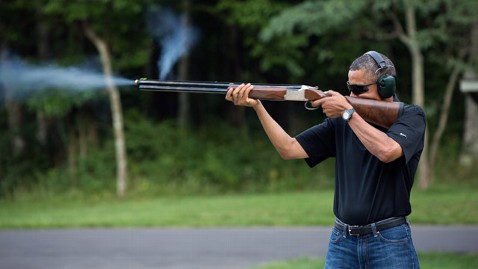
(Official White House Photo by Pete Souza)
After a week of speculation over the authenticity of claims by President Obama that he regularly participated in skeet shooting at Camp David, the White House released a photograph today showing him firing a shotgun.
The photo shows Obama targeting clay pigeons at the presidential retreat last August, according to the White House. In an interview published Sunday the president said he shoots skeet “all the time” during stays at the compound. The comment was a response to a question of whether he had ever held a gun.
“Not the girls, but oftentimes guests of mine go up there. And I have a profound respect for the traditions of hunting that trace back in this country for generations. And I think those who dismiss that out of hand make a big mistake,” he said.
READ: Skeet-Shooter Obama Has ‘Respect’ for Hunters
But amid a White House-backed push for stronger gun-control in the U.S., some questioned whether the claim was an embellishment or even true. Politicians who regularly use firearms often advertise the fact to gun owners, but ABC News has not found a quote from Obama referencing his own use before the statement on Sunday.
“If he is a skeet shooter, why have we not heard of this?” asked Rep. Marsha Blackburn, R-Tenn. “Why have we not seen photos? Why has he not referenced it at any point in time as we have had this gun debate that is ongoing?”
PHOTOS: From 2009 to Now: Obama Since His First Inauguration
Appearing on CNN this week, the congresswoman challenged Obama to a skeet shooting contest.
The Associated Press reported in 2010 a second-hand reference to the activity. After a visit with the Texas Christian University rifle team, a student reportedly told the AP that Obama told her he’d practiced shooting with the Secret Service.
This is the only known image of Obama holding a gun.
Asked Monday about the president’s interview, Press Secretary Jay Carney responded to reporters about how often the president participates in shooting.
“I would refer you simply to his comments,” he said. “I don’t know how often. He does go to Camp David with some regularity, but I’m not sure how often he’s done that.”"
On Wednesday, Carney addressed the issue again, telling press that when the president travels to “Camp David, he goes to spend time with his family and friends and relax, not to produce photographs.”
White House officials and some Obama supporters have compared skeet-doubters to “skeeters” or “birthers,” the label fixed to those who deny Obama was born on U.S. soil in his home state of Hawaii, and therefore is ineligible for the Oval Office.
“Attn skeet birthers. Make our day — let the photoshop conspiracies begin!” senior adviser David Plouffe wrote on Twitter this morning, referencing the popular photo-editing software.
In January, Obama signed several executive orders strengthening gun regulation and revealed proposals that, if enacted, would include bans on assault weapons and high capacity magazines. The move began in response to the December mass-shooting of 20 first graders and six adults at a Newtown, Conn., elementary school.
INFOGRAPHIC: Guns in America: By The Numbers
A recent ABC News/Washington Post poll found 53 percent of Americans viewed Obama’s gun control plan favorably, 41 percent unfavorably.
The photo’s release comes two days before Obama travels to Minneapolis for a speech continuing his push for tougher gun control, where he is expected to appear alongside local law enforcement officials.









